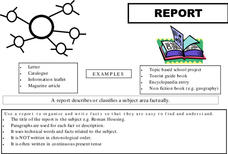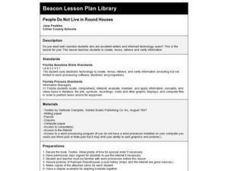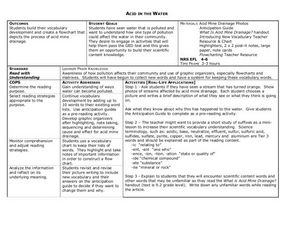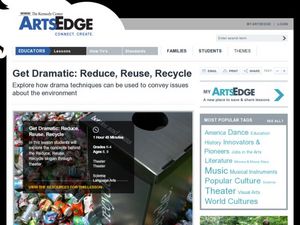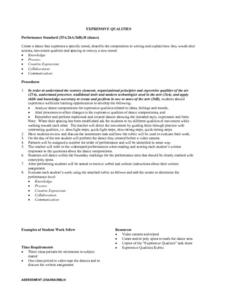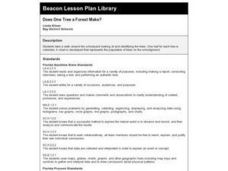EngageNY
Finishing Poster and Preparing for Gallery Walk
Practice makes progress! Using their drafts and resources from the previous lesson, pupils complete scientific posters for an upcoming gallery walk. Next, they practice presenting their posters to assigned partners.
Curated OER
Interviewing Skills
Prepare your pupils for the world of work and the dreaded interview by providing class members with a resource packet that includes handy tips. After examining the materials, pairs conduct mock interviews and reflect on the experience....
Curated OER
Non Fiction Posters
A set of very useful posters (in PDF) describing different types of non-fiction texts is here for you. While there isn't an activity, per se, in these worksheets, they could be used as a handy reference for learners who are engaging in...
Curated OER
Summarization Superstars
How do you read when you know you're going to be summarizing a text? Summarize a nonfiction text with your upper elementary schoolers. Your pupils independently read a nonfiction article and write a summary paragraph using the six-step...
National Wildlife Federation
What is DBH?
When measuring the circumference of a tree, does it matter how high you place the measuring tape? Most scholars have never considered this question, but scientists know that measurement techniques must be standardized. The 13th activity...
PBS
Stories of Painkiller Addiction: Myth or Fact
Are opioids the most abused drug after marijuana? How hard is it for young people to obtain painkillers without a prescription? Middle and high schoolers explore the growing epidemic of opioid addiction with a lesson that prompts them to...
National History Day
“Saving the Bear”: The Russian Expeditionary Force of World War One
How have Russian politics affected countries on a global stage? The discussion of the Russian Revolution and World War I begins with an analysis of primary resource letters. Learners finish with a project where they create a timeline of...
Curated OER
People Do Not Live in Round Houses
Third graders use a computer as a research tool. They make note cards as they go and use their note cards to guide their word processing. They edit their papers and add artwork.
Curated OER
Creating a Salad Dressing
Students investigate how the scientific process can be applied to making a new salad dressing recipe.
Curated OER
Reading/English Language Arts/ Instructional Strategies
Students are given a line drawing that only that students sees. They are asked to describe the drawings to the reset of the class to see if they can draw it as the teacher describes it. Students work with a partner, and they are given a...
Curated OER
Be a Weather Newscaster
Ninth graders, in groups, create and videotape a news broadcast. Each group researches, develops and writes a weather forecast, a commentary on an environmental concern, a school activity and a commercial.
Curated OER
Acid in the Water
Ninth graders learn about the effect pollution has on water and how this affects their community. In this environmental awareness lesson plan, 9th graders expand their vocabulary and create a flowchart that demonstrates...
Curated OER
Portfolio Autobiographies
Third graders create an autobiography on the computer. They write, design and illustrate using word processing and graphic tools on the computer.
Curated OER
Environmental Law-Making
Students go through the process of creating and passing a federal law. They select an environmental issue, research related policies for the issue, draft the bill, discuss it among committee members, bring it before the class and bring...
Curated OER
Designing the Experiment and Answering the Question
Young scholars investigate scientific methods by analyzing an article from the Natural Inquirer. For this data analysis lesson, students read an article from the magazine and discuss at least 2 scientific methods that could be used...
Curated OER
Making Healthy Eating Choices for You and Others
Students use the USDA food guide pyramid to choose items for a balanced diet. In this food pyramid lesson plan, students play a game naming the items and their foo groups. Students participate in cross curricular...
Curated OER
Get Dramatic: Reduce, Reuse, Recycle
Learners explain reducing, recycling and reusing. In this science/ arts instructional activity, students create a commercial and display a backdrop made out of recycled goods. Additionally, learners write written responses to writing...
Curated OER
EXPRESSIVE QUALITIES
Learners create a dance that expresses a specific mood. They describe the composition in writing and explain how they would alter actions, movement qualities and spacing to convey a new mood. They perform the dance they created...
Curated OER
Immigration: Stories of Yesterday and Today
Learners use Web technology to access immigration history and develop an understanding of the concept of immigration. Then they develop oral history writing skills, including note-taking and conducting an interview and read for detail....
Curated OER
Does One Tree a Forest Make?
Students take a walk around the schoolyard looking at and identifying the trees. One leaf for each tree is collected. A chart is developed that represents the population of trees on the school ground. They keep journals and write an essay.
Curated OER
Monoprint
Middle schoolers review Gerald Ferstman's work and discuss abstract art. They design and create monoprints on Mylar. They reflect on their work and write about the experience of creating the piece.
Curated OER
What Do We Owe To Thoreau?
Students use this design as an electronic reading and writing guide to Henry David Thoreau's famous essay, "On Civil Disobedience." They use activities to familiarize students with the political issues of Thoreau's time. Comprehension...
Curated OER
Ice Cream Toppings
Students explore the five senses. In this senses instructional activity, students use their senses to top their ice cream. Students compare and contrast the different toppings and write their observations, using descriptive words, in a...
Curated OER
Natural Inquirer
Students explore the research process. In this scientific method lesson, students analyze data from an article, write their own informational article and express what they have learned. Students create their own article using the given...




